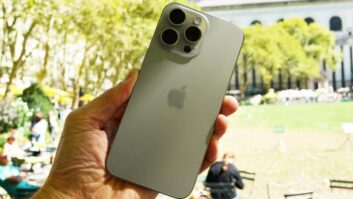J Star: This summer will bring the debut of Josh, an app-controlled high-end voice-control system incorporating artificial intelligence to control a multitude of home systems with natural-language voice commands. It was developed by former NASA research scientist, and JStar CEO, Alex Capecelatro. Josh plugs into a home’s Wi-Fi router and finds smart-home products in the house, including Z-Wave, ZigBee and Wi-Fi devices from Nest, Lifx, Philips Hue, Lutron, Nest, Smart Things, Belkin, Chamberlain and Sonos. The company plans to integrate with a lot more devices, such as products from Honeywell, Ecobee, Denon Heos, Bang & Olufsen, Insteon, Somfy and others.
Orion: The Onyx is a single-touch wearable accessory that solves communication challenges by making it easy to talk with anyone, anywhere in the world instantly. The lightweight Onyx seamlessly connects with iOS and Android devices delivering instant communication over wireless and cellular networks, anywhere that has as internet connection. The companion Orion app can create groups for multiple participants. With its unique clip, the Onyx can be worn on a shirt, jacket, necklace or bag strap. The Onyx comes in a variety of colors so consumers can choose the best one to accent any look.
UnaliWear: The Kanga Watch for seniors is a self-contained watch, not dependent on a connection to a home-based system or a smartphone. It allows discreet support for falls, medication reminders and guards against wandering in a classically styled watch with an easy-to-use speech interface rather than buttons. The Kanga Watch works 24/7 and incorporates artificial intelligence that learns the wearer’s lifestyle to provide predictive, pre-emptive support. Voice activated assistance will connect an operator who will confirm emergency assistance should be dispatched. If the wearer activates help and doesn’t respond immediately, emergency contacts are called or local medical assistance is dispatched immediately, depending on the preferences set.
IonVR: The husband-and-wife-created start-up has launched a virtual-reality headset for smartphones with proprietary MotionSync Technology, a hardware-based solution that reduces motion blur, thereby reducing the phenomenon of “VR sickness” related to blur and latency. The IonVR headset works across OS platforms on screens from 4 to 6 inches. It has a clever defense against obsolescence, built as a modular system to easily upgrade as technology changes. No need to buy a new headset when a new phone is released. Simply change the module. The modular system also allows for easy replacements.
Titan Robotics: The Colorado start-up is looking to disrupt the 3D-printing industry by offering lower-cost custom-made large-format industrial printers for small businesses. The company’s founder and CEO, Clay Guillory, is a mechanical engineer with a heart. After developing his first line of products he began volunteering with the organization E-Nable, which allows him to 3D-print prosthetics for children free of charge. The company has made advances in 3D-printed Paralympic devices for athletes competing on a global level and has manufactured an open-source bionic arm for a girl located in Colorado Springs.
8tracks: The company launched a unique crowd-curated internet radio service, with more than 6 million monthly active users creating, curating and sharing playlists. With only $3 million of funding, the start-up has pursued organic growth and revenue and has established itself as the third largest pure-play internet radio service among U.S. millennials. It is now aiming higher by announcing an equity crowdfunding round that allows anyone to invest in the company. A recent testing of the waters saw more than 30,000 people pledge more than over $30 million. 8tracks intends to use the funds to bring its service to a global audience and make it easier for listeners to find playlists on new platforms including the home and car. For DJs, they’ll be pursuing direct licensing deals with record labels to offer a complete music library for making playlists on web and mobile.
Nexgear: After a successful debut at CES, the company’s Frodo action camera is currently fundraising on Indiegogo. Dubbed “The Most Intelligent Adventure Camera,” Frodo can edit hours of footage down into ready-to-share videos in the camera, eliminating the need for an editing table or a PC. It also eschews mounting accessories, instead shipping with a proprietary rugged strap that mounts the cameras anywhere. It includes a detachable battery pack for long shooting sessions and boasts a boot time of 0.7 seconds for instant footage. It has a recording time of 1.5 hours at 1080 HD and is currently available for preorder in two in two options,16GB and 32GB, with future plans to launch a 64GB version. Frodo is expected to ship in November at a starting price of $149.
StoreDot: This Israeli start-up uses organic materials to fuel its nanodot batteries. Going into its debut at CES the company had already earned $76 million in funding. StoreDot has innovated batteries for smartphones and electric cars, producing a battery for electric vehicles that can charge in just five minutes and smartphone batteries that fully charge in one minute. Competing technologies are predominantly based on metals, including heavy and toxic metals. By contrast, StoreDot’s organic compounds are non-toxic and environmentally safe, readily available and manufactured at a fraction of the cost, the company said.
Owlet: The company debuted at CES its smart bootie and warning monitor, a way for parents to monitor their newborn’s vitals while the child is asleep. Using a mobile device, or by placing the monitor by their bed, parents can check up on the baby’s heart rate and respiration, helping to reduce incidences of SIDS. The company is seeking FDA clearance for a medical version of the device that can be used in hospitals or clinical settings by the middle of 2016. Owlet was awarded a collaborator role on a $1.5 million grant from the National Institute of Health to further development and research. Owlet was also included in an exclusive two-week program put on by the Mayo Clinic’s Center for Innovation.
Ultrahaptics: Based in the U.K., Ultrahaptics has a mission to change the way we use our devices through ultrasound technology. The company touts “feeling without touching,” by creating three-dimensional shapes with ultrasound technology that can sense changes in air pressure. No gloves or attachments needed; the feeling is projected onto your bare hands. This technology could lead to better virtual-reality technology as well as completely revolutionize how we use the devices through gesture control, by feeling tactile cues for invisible interfaces, textures, virtual objects and more.























